Keira Knightley Official Secrets
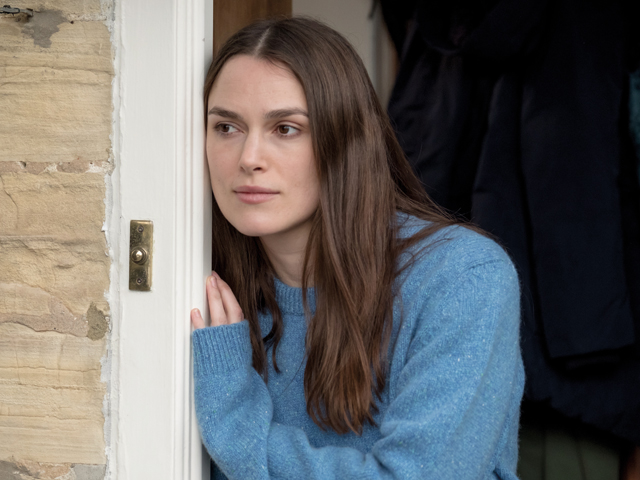
Nothing Is More Dangerous Than The Truth
Cast: Keira Knightley, Rhys Ifans, Matthew Goode, Ralph Fiennes, Matt Smith, Indira Varma
Director: Gavin Hood
Genre: Biography, Drama
Rated:
Running Time: 112 minutes
Synopsis: 25 February 2004. Katharine Gun is brought to trial for breaching the Official Secrets Act. The judge asks her how she pleads…
One year earlier. January 2003. The USA and Britain are aggressively seeking a UN resolution to invade Iraq.
With her husband YASAR, at their home in Cheltenham, England, Katharine watches news reports of British Prime Minister Tony Blair claiming, "war is inevitable".
A Mandarin translator at Government Communications Headquarters (GCHQ), Katharine receives a classified e-mail, a US directive to spy on UN Security Council members from five countries with a view to coercing them to sanction war in Iraq. Concerned, she visits her friend, Jasmine, asking if she could get this sensitive e-mail to anyone she knows.
3 February 2003. Katharine copies the e-mail and prints out a hard copy, bringing it home with her. Two weeks later, as the British public protests the possibility of war on the streets of London, Martin Bright, a journalist at The Observer newspaper, receives a call. In an underground car park, he meets anti-war protestor Yvonne Ridley, now in possession of Katharine's e-mail.
Martin starts to verify the authenticity of the e-mail, calling the National Security Agency and asking for Frank Koza, the man who sent it. Rebuffed, he and his colleague, war correspondent Peter Beaumont visit with Paul Beaver, an Independent Security Consultant, who agrees that the terminology used in the e-mail is genuine. Peter also meets an MI6 source who informs him that intelligence is being manipulated to go to war. Meanwhile, Observer journalist Ed Vulliamy speaks with a retired CIA contact, though he refuses to confirm the existence of Koza.
Concerned that the e-mail has come to nothing, Katharine meets with Jasmine, who says that Yvonne is having a hard time convincing the press the e-mail is real. Jasmine tells her it's out of their hands now. In Washington D.C., Ed Vulliamy receives a mysterious extension number to call; it is Koza's office at the NSA. He speaks to him, briefly, before Koza puts the phone down.
Back in London, Martin, Peter, Observer editor Roger Alton and others debate whether to print the e-mail. Peter says that the publicity may prevent a war. The story runs. Katharine sees it and confesses to Yasar what she has done. Martin, meanwhile, is the toast of the office, with American news outlets requesting interviews. Until a Drudge Report story claims the e-mail is a fake, pointing out that the spellings used are all English and not American. Nicole, a young intern, has accidentally run the copy through a spell-check, which automatically corrected the American spellings.
GCHQ begins to interview every employee to seek out the source of the leak. Anyone found withholding information will be in breach of the Official Secrets Act. Katharine is grilled but denies leaking the e-mail. The next day she calls in sick, but after hearing the U.S. denials of the authenticity of the e-mail, and of her own colleagues being interrogated, she confesses. Taken to a police station, she is questioned by Scotland Yard detectives and released on bail. 20 March 2003. With Iraq being bombed, Katharine contacts Liberty, a human rights law firm, and meets with lawyers James Welch, Shami Chakrabarti and Ben Emmerson. At home, she is paid a visit by Scotland Yard, telling her that discussing her case with lawyers could be a further breach of the Official Secrets Act. Emmerson is visited privately by his old friend, Ken Macdonald, the recently appointed Director of Public Prosecutions, who says he intends to prosecute Katharine.
Together Katharine and Yasar meet with the lawyers from Liberty to discuss her case. Emmerson suggests using the defense of "necessity" to defend Katharine in court. He proposes arguing that Katharine leaked the e-mail in order to stop an illegal war and save lives. Emmerson meets with Elizabeth Wilmshurst, the Deputy Legal Adviser at the Foreign Office, who confirms that at the time Katharine leaked the memo Attorney General Lord Goldsmith's advice was that war would be illegal without a new UN revolution. Wilmshurst resigned when Goldsmith changed his position on the legality of the war and declared it would be legal without a new UN resolution, just three days before the invasion.
25 February 2004. Katharine arrives at the Old Bailey, where she meets Martin Bright for the first time. She pleads 'not guilty' to the charges of breaching the Official Secrets Act. Shockingly, the prosecuting barrister Ellison announces to the court that the prosecution will be withdrawing the indictment against Katharine, claiming it would be a waste of taxpayers' money. Katharine Gun is free to go.
Official Secrets
Release Date: November 21st, 2019
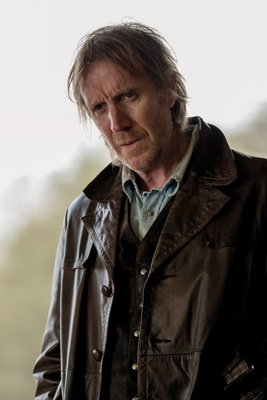 About The Production
About The Production
In 2003, Katharine Gun became headline news. A GCHQ translator specializing in Mandarin, Gun received an e-mail in the lead up to the invasion of Iraq. In this memo, the US government's National Security Agency urged UK cooperation in an intelligence "surge" to gather information on UN Security Council members, with a view to securing a UN resolution to send troops to Iraq. Horrified, Gun leaked the memo, which ultimately came into the possession of The Observer journalist Martin Bright.
A thorough investigation into the authenticity of the e-mail followed, led by Bright and his colleagues, before the story went to print on March 2, 2003, headlined: "US dirty tricks to win vote on Iraq War." With her department under intense scrutiny, Gun confessed the leak and lost her job. Moreover, she was arrested and – eventually – charged with a breach of the Official Secrets Act.
"Whistleblowers come in all shapes and sizes, but they do tend to be unusual people," remarks Bright. "They tend to be loners. They're often quite strange people. Katharine was amazingly sane. She was very clear about why she'd done what she did." As he points out, the "principled" Gun only ever leaked one document. "That's what makes her special. She's someone who decided to take this stand at considerable cost to her career and her personal life."
As the story was reported by the media, word on Katharine's actions spread. Daniel Ellsberg, the whistleblower behind the infamous leak of the Pentagon Papers, called Gun's actions: "the most important and courageous leak I have ever seen…no one else – including myself – has ever done what Gun did: tell truths at personal risk, before an imminent war, in time, possibly to avert it."
Unfortunately, Gun's actions did not prevent the invasion of Iraq or the huge loss of life that followed. After a year of anxiety, she went to trial, defended by the highly experienced lawyer Ben Emmerson. Remarkably, the charges were dropped, with many suspecting that the government did not wish to risk further embarrassment after the search for Weapons of Mass Destruction in Iraq – one of the main reasons to go to war – had proved fruitless.
"It was just a surreal moment," remembers Gun. "We were prepared to fight. I had declared I wanted to submit a 'no guilty' plea. We were prepared to take it all the way. It was almost like pulling the rug from under your feet. I was torn. On the one hand, I was elated because I thought 'The whole media circus that would've ensued if it had gone to a full judge and jury in court, that's been avoided.' But on the other hand, I thought the issues we're going to bring up in court aren't going to come up now. None of it's going to be scrutinized."
Yet those issues could be explored in other ways. For Gun, the process of bringing her story to the big screen began when Marcia and Thomas Mitchell approached her about writing a book on her experiences. Published in 2008, The Spy Who Tried to Stop a War: Katharine Gun and the Secret Plot to Sanction the Iraq Invasion soon led to various attempts to turn her story into a film. This included Official Secrets, a script by husband-and-wife team Gregory and Sara Bernstein, with producer Elizabeth Fowler (Devil's Knot) attached.
Such is the slow and often difficult nature of launching an independent film, Gun was skeptical. "I really thought it wasn't actually going to happen." But in 2015, producer Ged Doherty was sent the script by the film's executive producer, Claudia Bluemhuber. "The first time I read the story, I couldn't believe I didn't know anything about it," he says. "I was in London at the time of those anti-war marches, most of my friends were on those marches, and to this day I felt guilty I never went on them."
Teaming up with Elizabeth Fowler and fellow producer Melissa Shiyu Zuo, Doherty saw Official Secrets as a chance to tell an important story that "shines a light on what actually happened around that time". Gun, meanwhile, was delighted with his interest and enthusiasm in getting her story to the screen. "Ged came on board and said, 'We really want to tell your story'," she says. "I thought, 'Wow, this is amazing. It's fate. It's finally coming to fruition."
As luck would have it, Bluemhuber had also sent the script to director Gavin Hood, the South African-born filmmaker behind the Oscar-winning Tsotsi. Bluemhuber had worked with Hood on his previous movie, 2015's Eye in the Sky, with Helen Mirren, which Doherty had produced through his production company Raindog Films. With political dramas like Rendition also on his record, Hood "was born to do" Official Secrets, says Doherty. "It's totally in his wheelhouse and the kind of thing that he and I love – a bit of controversy, a bit of politics, shining a light on people who've done things they shouldn't and lie to us all."
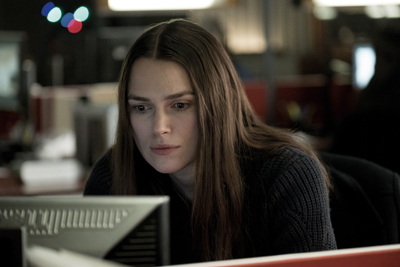 Like Doherty, Hood was hooked by a story that didn't feel "abstract and theoretical" like, say, the Chilcot report, the Iraq inquiry led by Sir John Chilcott published in July 2016. "When I read the story," he says, "it felt like this was a way into a very large event through a particular individual. It allowed me to look at this period of time in quite a personal way, through the story of an essentially ordinary person who found themselves in an extraordinary situation."
Like Doherty, Hood was hooked by a story that didn't feel "abstract and theoretical" like, say, the Chilcot report, the Iraq inquiry led by Sir John Chilcott published in July 2016. "When I read the story," he says, "it felt like this was a way into a very large event through a particular individual. It allowed me to look at this period of time in quite a personal way, through the story of an essentially ordinary person who found themselves in an extraordinary situation." Nevertheless, Hood immediately recognized the difficulties in turning Katharine's hellish year-long odyssey into a movie. "The structural challenge from a writing point-of-view and directing point-of-view was that the third act, which is the build-up to the court case, results in a non-event in a way," he says. "There is no court case." Working with the Bernsteins initially, Hood began to refine the script.
Further difficulties included telling a story where, in reality, Katharine only meets Martin Bright just before she goes to trial (Bright didn't even know who leaked the e-mail until she was arrested). But Hood was determined not to veer off into more fanciful territory. "The real challenge was 'How can we tell this story in a way that is accurate and true and still have it be dramatic without deviating from the truth in order to create a 'Hollywood' movie?'"
Research became paramount, and Hood spent a year investigating his subject. He interviewed extensively Martin Bright, and fellow Observer journalists Peter Beaumont and Ed Vulliamy, who were also key in cracking the story. "Once Gavin was involved, it was very clear that he wanted it to be as close to the original events, with as little poetic license, as possible," comments Bright. "He was very keen that all the events involving the journalists, all the events involving me, were represented as they happened." This included the horrific moment when The Observer ran the story, only for the leaked e-mail to be deemed fake because it features English not American spellings (the results of an over-zealous intern running the copy through Spell Check). "That Spell Check moment…you couldn't make that up," laughs Hood. "It was one of the most awful points of my journalist career, really," laments Bright. "Comic but appalling."
As Hood crafted the story to reflect the details his research was revealing to him, he had one overriding ambition with the script. "The important thing, for the sake of the integrity of the film, was to be sure that we the filmmakers could appear with the actors and Katharine and the key investigative journalists, side-by-side, knowing that the story had been told with integrity. Obviously in compressing a series of events that took place over more than a year into a two-hour film you have to take some dramatic license and compress time and select key moments to focus on, but the material facts have to be accurate in a film of this kind."
Hood also spent time with Gun's lawyer Ben Emmerson, both in person and via e-mail. "When I met Ben, it was quite intimidating because he speaks fast, he speaks with great intelligence, and he doesn't suffer fools gladly," says Hood, whose own legal background – as a student, he studied law in South Africa – came in handy. Others on Hood's radar included James Welch, lawyer at the human rights organisation Liberty, who came to Katharine's aid, as well as security expert Paul Beaver.
Above all, crucially, he interviewed Katharine Gun. "When I first met her, it was quite difficult to win her over," the director admits. "I sat with her for five days. Each day, I'd come in and we'd work for four or five hours, and then we'd call it quits and she'd go and spend time with her daughter. Over the course of those five days, I'd like to think won her trust. I just let her tell me what really happened without trying to bend it into something that might be more exciting from a 'Hollywood film' point of view."
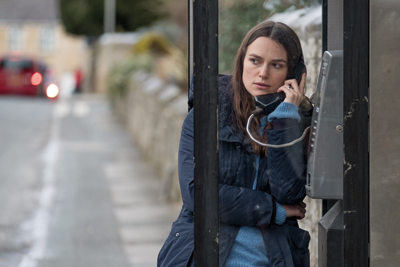 Spending all this time with Hood, Gun soon put aside her natural skepticism. "He's so full of energy and he's so passionate and so determined to get to the nitty-gritty of everything," she reflects. "We spent a week and we went through it all, and he wanted me to tell him everything, from A to Z, so that he could get a really clear picture in his head. I was very reassured when I met him. It showed us he really had that drive to get it going."
Spending all this time with Hood, Gun soon put aside her natural skepticism. "He's so full of energy and he's so passionate and so determined to get to the nitty-gritty of everything," she reflects. "We spent a week and we went through it all, and he wanted me to tell him everything, from A to Z, so that he could get a really clear picture in his head. I was very reassured when I met him. It showed us he really had that drive to get it going." In particular, Hood and Gun discussed the flow of events, which took place over the course of a year but had to be compressed into a two-hour movie. "It's hard to portray that in a film," says Gun. In reality, a lot of the experience was "very internal", as she turned events over in her mind after she was fired from GCHQ. "I immediately lost all my friends. So it was very isolating. But it's hard to portray someone just sitting there moping! So we had all of these discussions."
Another key conversation was regarding Gun's husband Yasar, who was almost deported during the aftermath of the leak but saved at the eleventh hour. For Hood, it was vital to feature this to show the genuine love between Katharine and Yasar, rocked after the leak. "The emotional feeling of that reconciliation is what re-established their love, their connection, after he'd been pretty frustrated and thrown that she'd [leaked the e-mail] without telling him she was going to do it."
Hood's attempts to convey not only Gun's story, but the way it unfolded, impressed Bright. "The way that it's written does capture what it's like to break a big story," he says. "We had long discussions about the dynamics of a newsroom, because one of the frustrating things as a journalist watching newsroom drama is that it's very rarely captured well. So we were very keen to make sure the nuts and bolts of that newsroom life were accurately represented."
The Cast And Characters Of Offical Secrets:
Bringing actors to Official Secrets was always going to be a challenge. "When you're dealing with real-life characters as smart and unique and with the powerful personality of a Ben Emmerson or the genuineness, intelligence, kindness and determination of a reporter like Martin Bright or someone with the spine, courage and integrity of a person like Katharine Gun, you really need to find actors that embody those qualities in themselves," says Hood.
The first actor on board was British two-time Oscar-nominee Keira Knightley, cast as Katharine Gun. "We just thought she would be the perfect person," offers Doherty. "She'd never played anything like this, and if she would be willing to take a risk on it, it would be a phenomenal role for her. That was the main reason and she gravitated towards it straight away, which was brilliant." Knightley was 17 when the Iraq war began in 2003 and admits now that Katharine's story was not one she recalled. "I didn't remember Katharine Gun. I was pretty politically aware but at that point I was in America, and it obviously wasn't really covered there at all. So I thought it was really interesting that there was a story that is such a significant part of modern history that wasn't really known about or remembered. It was an important story to tell and to put out there."
When it came to research, Knightley diligently read the Marcia and Thomas Mitchell book and waded through the hefty Chilcot report. She also read government e-mails from the time that are now in the public domain "to give me the background I needed to play the scenes; the knowledge I felt she probably would've had in some way that made her so absolutely certain that leaking that document was the right thing to do".
While Knightley also got to spend time with Gun, speaking to her about events wasn't easy. "She's in quite a tricky position because if you question her really on it, she still is bound by the Official Secrets Act. I'm not a journalist, I'm an actress. So I didn't feel it was my place to push her into revealing to me any more than she felt comfortable with and that she had already revealed to go into the script."
Meeting Knightley was also strange for Gun. "I met her before filming took place because she wanted to meet me," she recalls. "We went out for a meal with Gavin and I felt relaxed quite soon after she walked into the restaurant because she came up to me and gave me a big hug! She had lots of questions. She was really keen to know absolutely as much as she could about how I felt at the time and what was going through my mind."
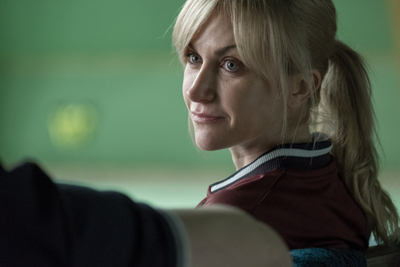 When it came to casting Martin Bright, Doherty suggested The Crown star Matt Smith to Hood, and the director agreed. By chance Bright knew him already. Back when he was political editor of the New Statesman, Bright had been an advisor on the TV show Party Animals, which featured Smith. "I'd shown him around Parliament, as I had with the other actors, as part of my job on that TV programme," says Bright. "We were able to have quite an easy connection as a result of that."
When it came to casting Martin Bright, Doherty suggested The Crown star Matt Smith to Hood, and the director agreed. By chance Bright knew him already. Back when he was political editor of the New Statesman, Bright had been an advisor on the TV show Party Animals, which featured Smith. "I'd shown him around Parliament, as I had with the other actors, as part of my job on that TV programme," says Bright. "We were able to have quite an easy connection as a result of that." Bright contacted Smith, who was on a beach holiday in Mexico at the time. "It was a strange situation to be in," says Bright. "I was saying to Matt, 'This is slightly awkward. Would you like to play me?'" Fortunately, Smith responded swiftly and positively. "I just thought it was a very present and pertinent and interesting story," the actor says. "Women speaking up and taking a stand…there are a lot of things that feel very present."
As Hood recalls, "I love the comment that Martin made about Matt. He said, 'You know, I think Matt is a better Martin Bright than I am!'" Bright clarifies: "On a very practical level he was just about the same age as I was at the time. He's got a kind of intensity that is important…that kind of journalism involves a degree of intensity. There's a seriousness that's involved that he was very aware of, so it did strike me that he was someone who could take on that role."
Having played real characters before, Smith was all too aware of what was required. "It's not like Prince Philip or Robert Mapplethorpe or Charles Manson where you can try and bottle a vague essence of someone. With this, it was about bottling my version of this journalist in this story. I tried to tell it as simply as possible. There's a no-frills nature to him." Smith even took advice from Bright who texted him some wisdom from the Sunday Times' Nick Tomlin: "The main attributes of a good journalist are: rat-like cunning, plausible manner and a little literary ability."
After securing Smith, Hood and casting director Kate Dowd began to work on the supporting roles. Welsh actor Rhys Ifans was sought to play Ed Vulliamy. Hood met him when he was rehearsing a play. "He said, 'Gavin, it's only a couple of scenes and I don't mean to be rude but I don't know you. If we'd been at drama school together, maybe. But I don't really know you.' And I said, 'Would you like a cup of tea? Let's get to know one another!' The twinkle came in his eyes and he said, 'You bastard!'"
While Hood and Ifans began to get to know each other over tea, Ifans had some thoughts on Vulliamy's character. "He gave me a couple of pointers and questions and I said, 'I will go away and have a crack at this.' So I went away, and I tweaked the scenes a bit and I sent them back to him, and his agent called my producer and said, 'This has never happened to Rhys. He was concerned, but he so enjoyed Gavin he felt that he actually addressed the notes he gave – and he'd be delighted to be in the film!'"
Another key member of the cast was two-time Oscar nominee Ralph Fiennes, who came in to play Gun's lawyer Ben Emmerson. "I thought it was a very important story being told which is still resonant now, about government transparency or lack of transparency," says Fiennes. "I also thought Eye in The Sky, Gavin's film, was very strong. And I thought the part was really interesting. I met Ben Emmerson, and that clarified all my instincts that it was a good thing to be part of."
He and Emmerson spent a few hours together in a "dark and Hogarthian" restaurant in London. "He has a very strong presence, which can be intimidating if he chooses it to be," says Fiennes of the lawyer who also represented Marina Litvinenko, widow to the poisoned ex-KGB agent Alexander Litvinenko. "Within a few minutes of talking to Ben, you feel the force of someone who will take on tough causes because there is an ethical urgency within his work."
For Hood, it was crucial to get an actor of Fiennes' stature to play Emmerson, not least because he arrives late on in the narrative. "I desperately wanted someone like Ralph to do it. I needed a significant presence to take the baton in the third act, and not drop it," he remarks. "I MEAN you've got Matt Smith who is going to deliver at a very high level through those first two acts – and to the end of the film as well – but you don't want him handing off to a lesser actor in that third act."
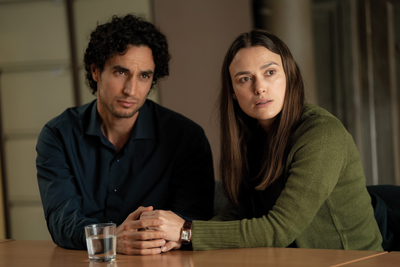 Joining Fiennes were John Heffernan and Indira Varma, cast as the fellow lawyers from Liberty, James Welch and Shami Chakrabarti. Heffernan, who had worked with Hood on Eye in The Sky, met with Welch for drinks during prep. "I basically wanted to hear everything he could remember about that period. He was really helpful about that relationship. It was extraordinary, the amount of media attention it got. After the trial, he and Shami went for a week round various media outlets saying 'I'm so glad she's been exonerated but why? What is the government covering up?'"
Joining Fiennes were John Heffernan and Indira Varma, cast as the fellow lawyers from Liberty, James Welch and Shami Chakrabarti. Heffernan, who had worked with Hood on Eye in The Sky, met with Welch for drinks during prep. "I basically wanted to hear everything he could remember about that period. He was really helpful about that relationship. It was extraordinary, the amount of media attention it got. After the trial, he and Shami went for a week round various media outlets saying 'I'm so glad she's been exonerated but why? What is the government covering up?'" Likewise, Varma spent time with her character's real-life counterpart. "She invited me to the House of Lords for tea!" she smiles, recalling how much Chakrabarti empathized with Gun. "I was surprised that she was so emotionally engaged in it. I imagined that lawyers are all cut and dried and have a perspective and quite objective, but she said, 'We felt really emotional about it.' But of course you couldn't show those emotions, you couldn't express them."
Rounding out the cast was Adam Bakri (Omar) as Katharine's husband Yasar, Matthew Goode (Downton Abbey, Brideshead Revisited) as Observer journalist Peter Beaumont, and Conleth Hill (Game of Thrones) as the paper's editor, Roger Alton. MyAnna Buring (Kill List, The Twilight Saga) came in to play Katharine's friend and contact Jasmine, while Jeremy Northam signed on to play Ken Macdonald, the Director of Public Prosecutions.
Continuing the hugely impressive roll call, acclaimed actress Tamsin Greig was cast as Elizabeth Wilmshurst, the Deputy Legal Adviser at the Foreign Office, while another Eye in the Sky alumni Monica Dolan, reunited with Hood to play Gun's supervisor Fiona Bygate. "Every one of these characters is critical to the integrity of the story," says Hood, who notes that "the stakes were pretty high" in terms of delivering an ensemble the financiers would back.
Yet, as Knightley notes, it was Gun's story that drew in this superb cast. "[We had] people who were coming in to do one scene or a couple of lines who were extraordinary actors, who just felt they wanted to be a part of this thing…I think that gave an energy that was really special."
On The Road With Official Secrets:
Production for Official Secrets began in March 2018 and shot for 39 days. Despite the story being set in Cheltenham, London, Iraq and Washington D.C., filming was completed in Manchester, Liverpool and Yorkshire, with Doherty comparing the shoot to a "road movie". Investment from Screen Yorkshire meant the county was used extensively. Bradford provided key locations, including the splendid interior of Bradford City Hall, which doubled for the hallways of the Old Bailey.
The park in Washington D.C., where Ed Vulliamy meets his ex-CIA contract, was shot at the Roundhay Boathouse in Leeds, part of the Leeds rowing club. To recreate GCHQ, the British Library in Boston Spa was used for the exterior gates. Doncaster-based Robin Hood Airport doubled for the Immigration Removal Centre at Heathrow. Otley Police Station also featured as the Cheltenham equivalent where Yasar is held.
For the Old Bailey interior, seen in the final act, the team went to County Sessions House in Liverpool. "Even the streets of London outside the Old Bailey you can double in Manchester," smiles Doherty. "Bring up a couple of double-decker buses and taxis and you'd think you're in London!" Perhaps even more impressively, the bombed-out site in Iraq, where we glimpse Peter Beaumont, was recreated at Pilkington Glass Factory in St. Helens, Merseyside.
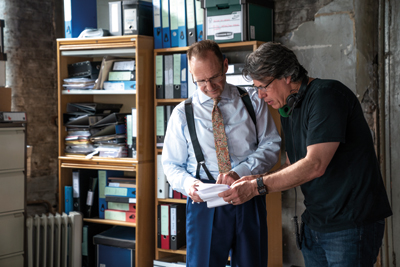 Sets were also built. Production designer Simon Rogers (Tyrannosaur) and his team recreated The Observer offices at a disused building in Manchester. Katharine and Yasar's two-up-two-down house, meanwhile, was built at Northern TV & Film Studio in Goldthorpe. "The interior you want to be able to control," explains Doherty. "No traffic outside, you can have walls that move, if it rains…it's a lot more controlled. Gavin as a director likes to build a lot more sets. He's more in control. It's more time-effective, more cost-effective."
Sets were also built. Production designer Simon Rogers (Tyrannosaur) and his team recreated The Observer offices at a disused building in Manchester. Katharine and Yasar's two-up-two-down house, meanwhile, was built at Northern TV & Film Studio in Goldthorpe. "The interior you want to be able to control," explains Doherty. "No traffic outside, you can have walls that move, if it rains…it's a lot more controlled. Gavin as a director likes to build a lot more sets. He's more in control. It's more time-effective, more cost-effective." One special visitor to the set was Katharine Gun, who arrived to watch the tense scene where she prints off the e-mail at GCHQ. "It was kind of odd," she admits, watching Knightley play out such a crucial moment in her life, but was impressed by the concentration levels required. "Especially the actors and actresses who have to keep saying the same thing again and again and remaining focused on that one scene…it was really fascinating to see how the whole process is put together."
As for the cast, it was a chance to work – or in some cases reunite – with some wonderful actors. Fiennes, for example, last worked with Knightley on Saul Dibb's The Duchess in 2008. "I have a very high regard for Keira," he says. "I think her performances on screen just get richer and richer. She did some fantastic things in the courtroom. Really impressive screen acting. I loved what she was doing in The Duchess but I think she was accessing something very powerful as Katharine Gun in the moments I had with her."
For Knightley, as much as she enjoyed filming, the shoot was exhausting as her 3-year-old daughter wasn't sleeping well. "The weeks when I had the most work, she was literally up five or six times a night between midnight and 6am. I think that added a particular vibe probably to my performance which maybe I should thank her for or maybe I should blame it all on her for – I'm not quite sure! But that was the most difficult thing for me."
Despite pressure of time, Hood was determined to find "little moments" with the actors. "What Keira and Matt have in common is they're incredibly instinctive actors," he says. He cites one tiny example when Katharine is at home and calls in sick to GCHQ; a moment later her husband opens the front door and the incoming daylight made Knightley flinch. "She's so in the moment of what she's doing," he says, "the reactions are fresh and not planned."
Often keeping the eye-line marks very tight to the camera lens, Hood notes that the scenes he is most proud of are when Katharine is about to confess the leak. "That camera is tracking around her on an extreme close-up looking right into her face, asking her to take the time to struggle through the decision. That is something that in the hands of a lesser actor could be a little forced. And in Keira's case, when she makes that decision to get up, you feel that you've lived that internal struggle with her."
Once the shoot wrapped, post-production began and Hood reunited with Megan Gill, the editor with whom he has worked on almost every film since 2005's Tsotsi. Likewise, he recruited composers Paul Hepker and Mark Kilian, who have scored a number of his films since Tsotsi. But the most troubling moment – in his mind at least – was showing the finished film to Katharine Gun. "I was terrified. Who knows what her reaction was going to be? Who knows what her husband's reaction was going to be?"
Gun, who now lives with her husband and daughter in Turkey, saw the film on a trip to London. "When I saw it, a lot of it is very close to the mark," she reflects. "It brought things back to me and it was quite weird seeing the same sort of scenes repeated in front of my eyes….it was a bit of an emotional rollercoaster ride."
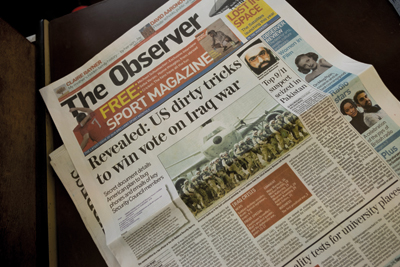 Watching the finished film with relatives, including her father, it invariably stirred up old feelings. "We were all saying how angry we were again about the whole debacle and how really it's an open sore. I hope it will make people realise how nothing much has changed. It's been a continuum of the same for the last fifteen years and it's a really shocking state of affairs. There's a whole new generation who won't have caught onto this yet, because they were under 10 when it happened."
Watching the finished film with relatives, including her father, it invariably stirred up old feelings. "We were all saying how angry we were again about the whole debacle and how really it's an open sore. I hope it will make people realise how nothing much has changed. It's been a continuum of the same for the last fifteen years and it's a really shocking state of affairs. There's a whole new generation who won't have caught onto this yet, because they were under 10 when it happened." As Bright puts it, Katharine's story – and the Iraq war itself – has huge ramifications. "This is a war that corroded all our major institutions – our judicial system, our political system, the intelligence services and the press. So it continues to have a major effect on our public life. If there's a central core to this story, it's that. What Katharine was revealing went beyond a simple piece of wrongdoing. What she was revealing was something wrong at the heart of our national and international institutions."
As difficult as the process was, Gun is delighted that the British government's lack of transparency will once again come under the spotlight when Official Secrets is released to audiences worldwide. "It's this whole paradigm of what is national interest?" she says. "So much gets swept under that overall heading. Who is to decide what is in the national interest?" As Fiennes puts it, like fellow whistleblowers Edward Snowden and Chelsea Manning, Katharine Gun needs to be celebrated. "That courage is really rare."
Official Secrets
Release Date: November 21st, 2019
MORE



